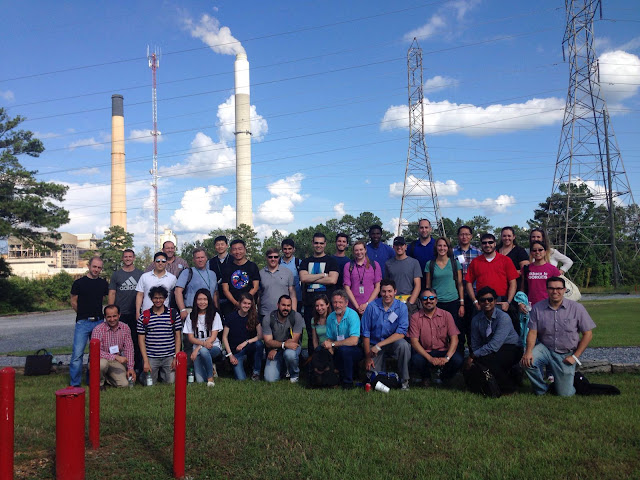By Karl McAlinden; GERC affiliated PhD student in the School of Contemporary Chinese Studies, University of Nottingham
From the outset, I’d like to
mention that without the notification and assistance from the GeoEnergy
Research Centre (GERC) my attendance and participation in the Research
Experience in Carbon Sequestration (RECS) programme would not have been
possible. I am very grateful for their continued kindness and support
throughout my PhD programme and research career.
premier carbon capture,
utilization and storage (CCUS) education and training experience in the U.S.”
After spending the last ten days immersed in its intensive programme, I can
safely say it lives up to its claims and is certainty a hard act to follow.
With a goal to “prepare a world-class [CCUS-ready] workforce,” the programme
has brought together some of the most talented and dedicated U.S.-based
graduate students, early career researchers and young professionals, all with
backgrounds either focusing on or closely related to one or more components of
the CCUS chain. Although it is primarily focused on “enhancing U.S.
competitiveness,” the programme also actively “nurtures career networks,
facilitates research opportunities and technology breakthroughs,” which is why I
was lucky enough to be one of only five international participants to be
offered a place to attend and participate. Building upon its alumni (and
faculty) year-on- year, it is through exercises such as RECS that CCUS can grow
and make strides towards real world realization. Already in its fourteenth
successive year, below you can see the latest addition to this network of RECS
alumni, the 2016 cohort.
 |
| The RECS 2016 Cohort at the National Carbon
Capture Center (NCCC) |
When
I initially saw that RECS would be taking place in Birmingham, I was keen to
explore the city in the West Midlands I had yet to visit. When I realised the
programme was sponsored by the U.S. Department of Energy (DoE) and that the
Birmingham they referred to was actually in Alabama, I have to admit its US
namesake seemed much more of an intriguing adventure. Arriving early Sunday
morning, before the welcome dinner that evening, I took the opportunity to
learn more about the local history by visiting the Civil Rights Institute,
which provided a fascinating glimpse at how much things have changed within the
area in recent decades. Meeting our group for the first time that evening, it
was clear that we had an interesting and dynamic group and it was shaping up to
be an exciting few days ahead.
 |
Left: Rosa Parks Statue, The Civil Rights Institute,
Birmingham, Alabama
Right: One of the many group dinners we had throughout
the programme |
What was special about the RECS programme, compared to other similar
courses I have attended in the UK and internationally, was the effort to
equally address all components of the CCUS chain and to show how an integrated
consideration of both technical and business design, as well as policy and
regulatory provisions, is essential to the success of CCUS project advancement.
While we were really spoiled with the level and wide variety of expert speakers
from government, academia and industry on their personal and professional
experiences of CCUS development in the South East U.S., my personal highlights
were the talks given by Mr. Andrew Hlasko (U.S. DoE’s CCS Demonstration Program), Ms. Dina Kruger
(formerly U.S. EPA,’s Climate Change Office) and Dr Victor Der (Global CCS
Institute, America), as well as that of Dr Craig Hart (Renmin University of
China), who’s research areas are most closely aligned with my own interests.
With a programme to meet all CCUS-related disciplines, research fields and
interests, everyone was without doubt kept intrigued and engaged on the familiar,
as well as the less so familiar aspects of CCUS. For the full programme of
speakers and events and to see what might interest you, please see: http://www.recsco2.org/program).
 |
| Alabama State
Geological Survey, Tuscaloosa |
Additionally, what was truly unique
about RECS was not only the level of expert speakers but also the degree of
access to CCUS-related companies, laboratories, pilot projects and
demonstration plants throughout the programme. Remarkably, in just a few days, we visited the Alabama Power
Headquarters in Birmingham, the National Carbon Capture Center (NCCC) in
Wilsonville, the Alabama State Geological Survey in Tuscaloosa, the Plant Barry
25MW CO2 Capture Demonstration Project in Mobile and the Mississippi
Power IGCC Energy facility and North American Coal’s Liberty Mine in Kemper
Country, Mississippi. With access to many of these facilities very generously
facilitated by Southern Company, I was greatly impressed by their genuine
interest in CCUS, as well as their generosity, openness and eagerness to engage
with others for the advancement of the technologies.
 |
| Mississippi Power IGCC
Facilities, Kemper Country, Mississippi |
 |
| North American Coal’s
Liberty Mine, Kemper Country, Mississippi |
Much of the thanks for the idea,
planning, operation and continued vision of the RECS programme goes to its
Founder and Director, Pamela Tomski, who, along with Dr Craig Hart, took the
time to sit down personally with each student to offer one-on-one career advice
for finding the best way forward in this uncertain but potentially promising
CCUS field. I would, without question, recommend the RECS programme to any
current or future graduate student or young professional, who is interested in
learning more about CCUS, hoping to expand their international CCUS network and
seeking to gain an insight into the U.S. CCUS-related engineering, geology
and/or policy and regulatory environment. I’m sure my participation in RECS
2016 will not only benefit my immediate research knowledge but will also lead
to many more fruitful opportunities well into my research career and
professional future.
 |
| Geology Field Trip |
Did you know?
Karl previously wrote a blog for the GERC Diary highlighting his research interests and numerous global adventures. You can read it
here
*You can keep up to date with GERC activities on our social media channels*






Comments
Post a Comment